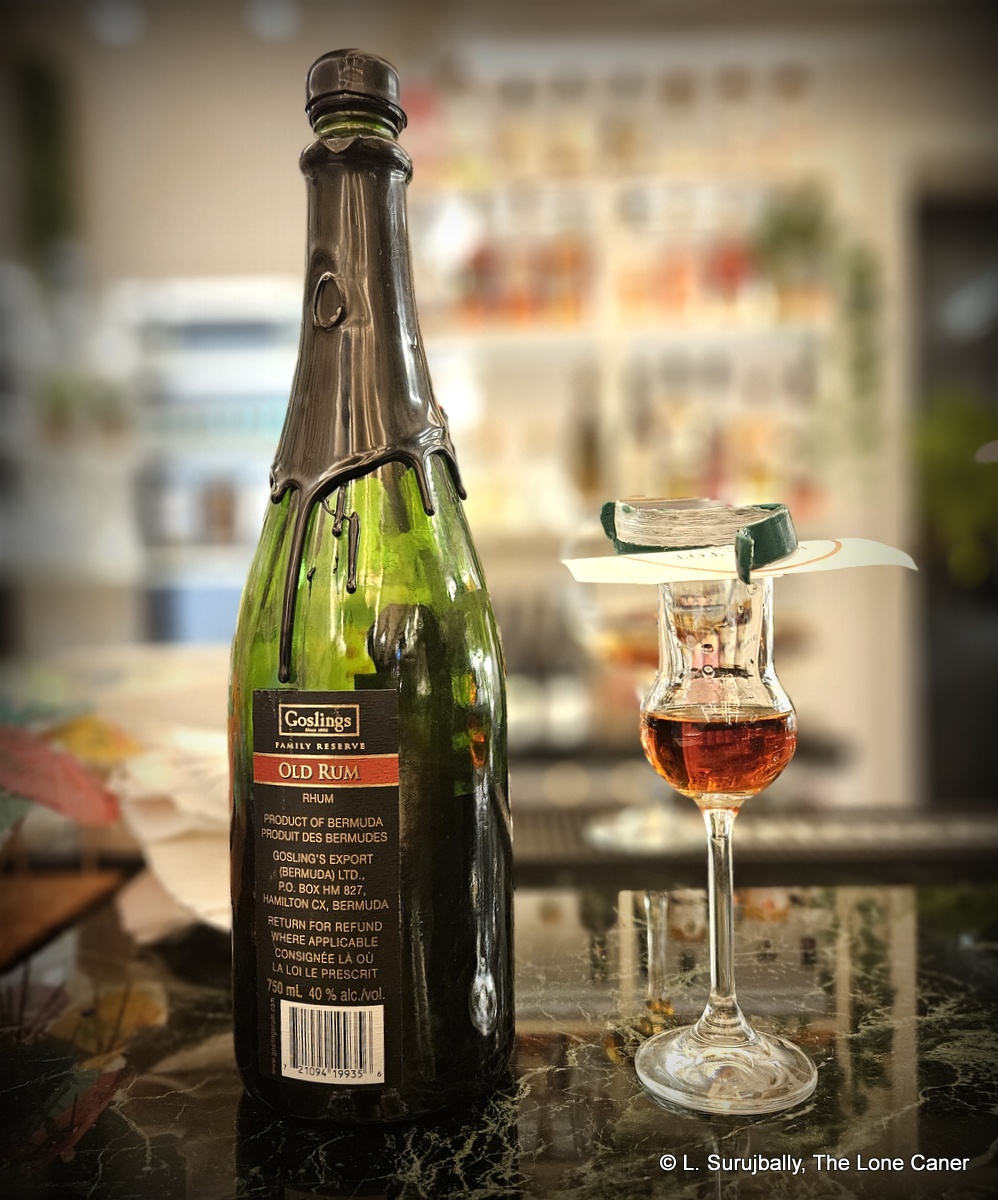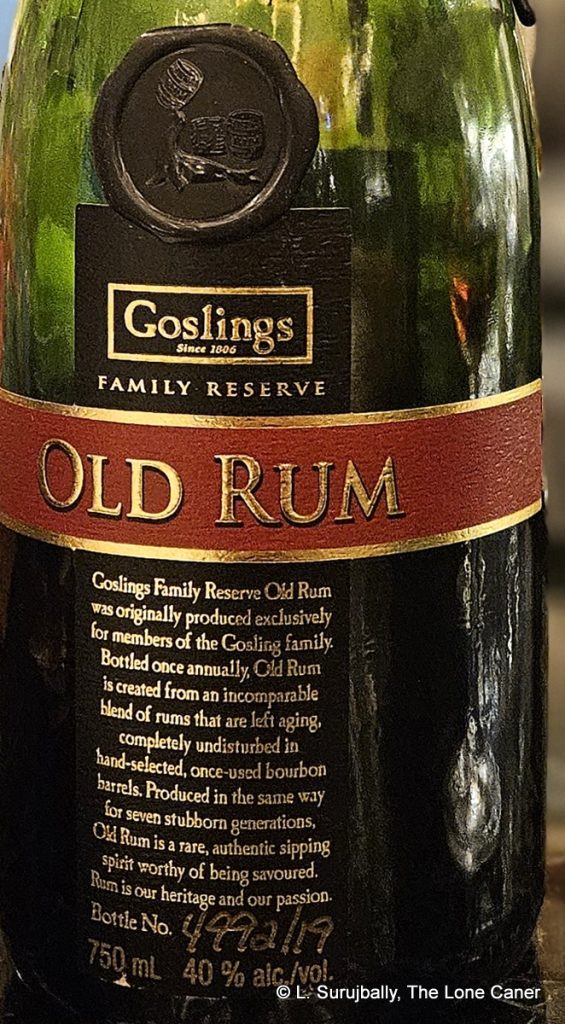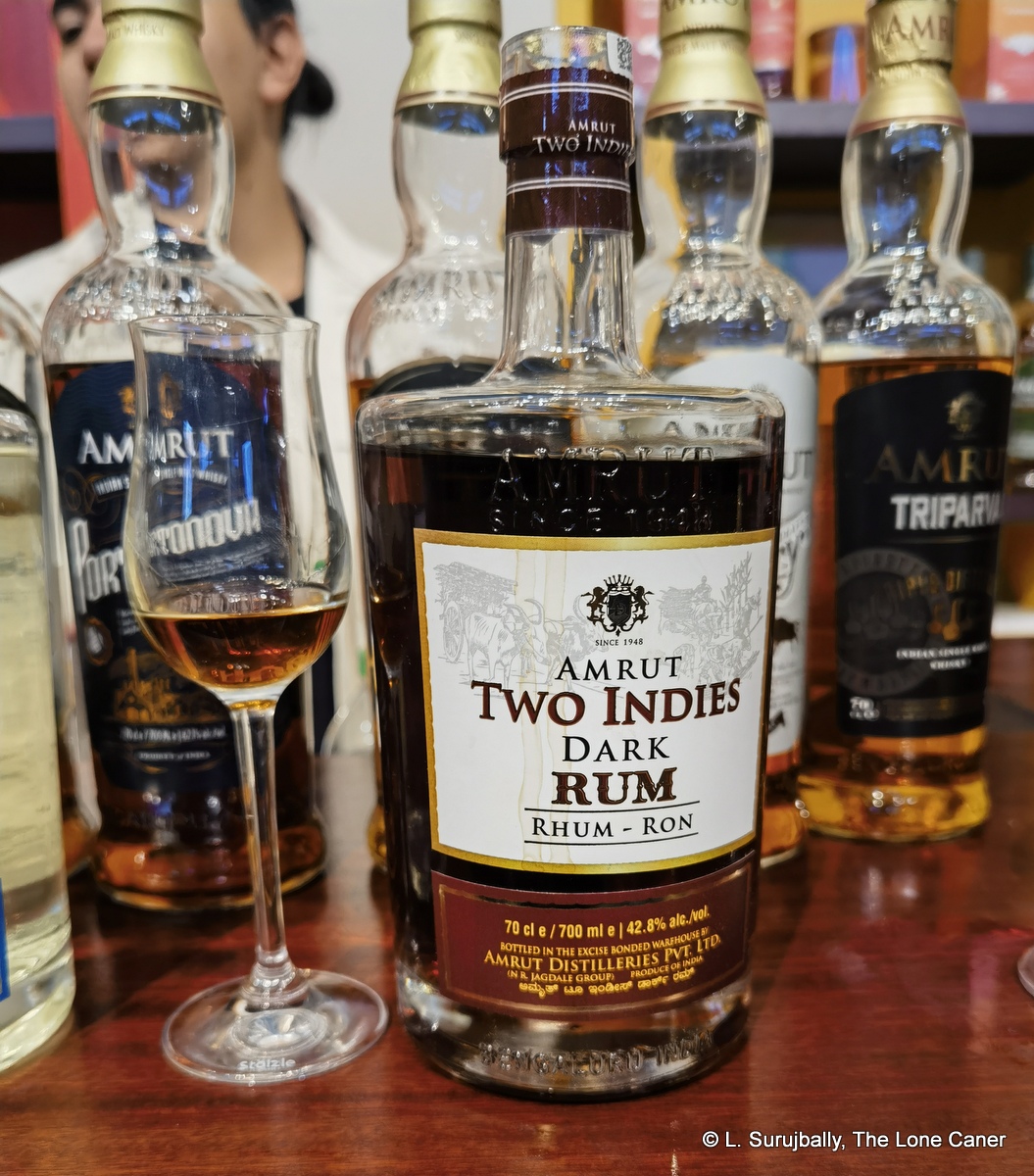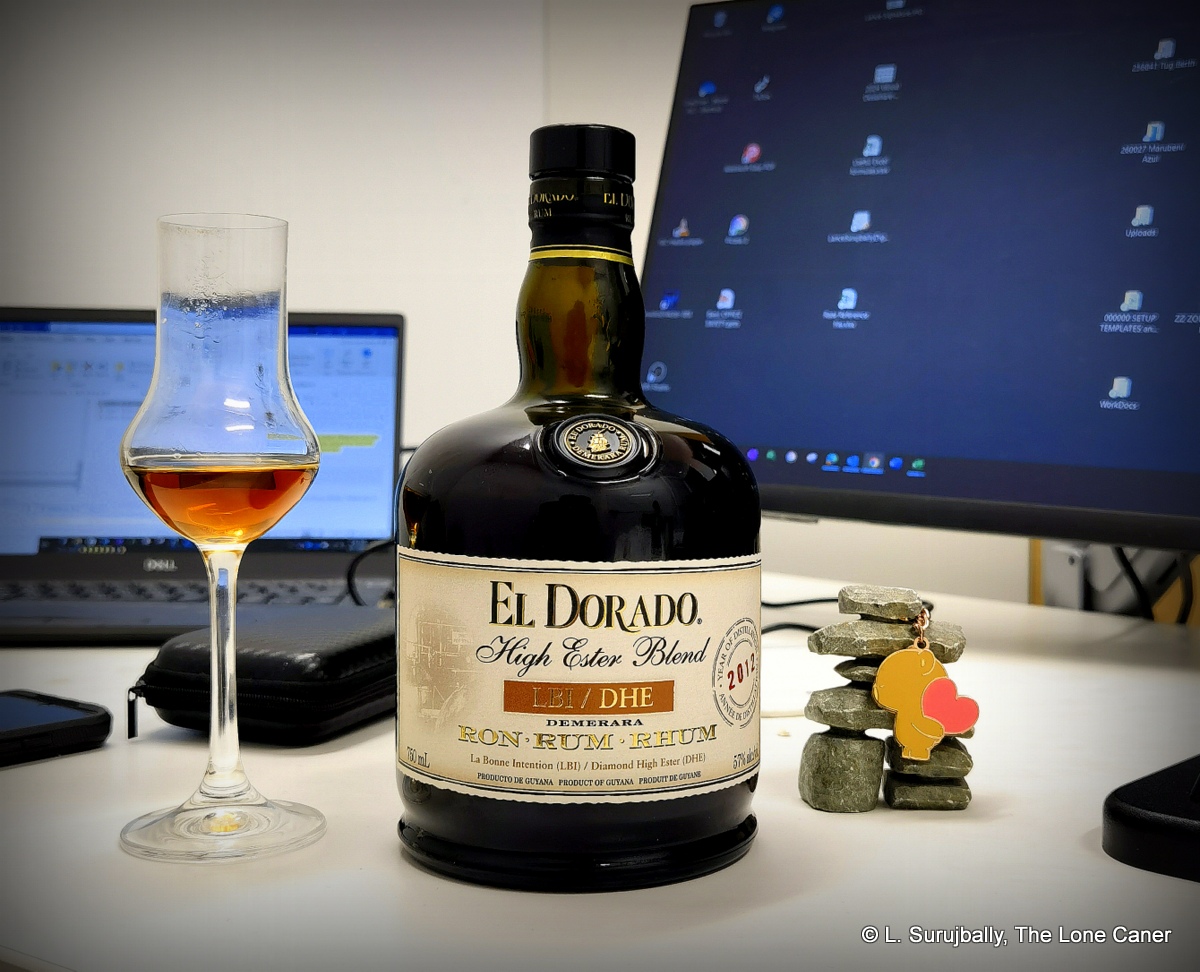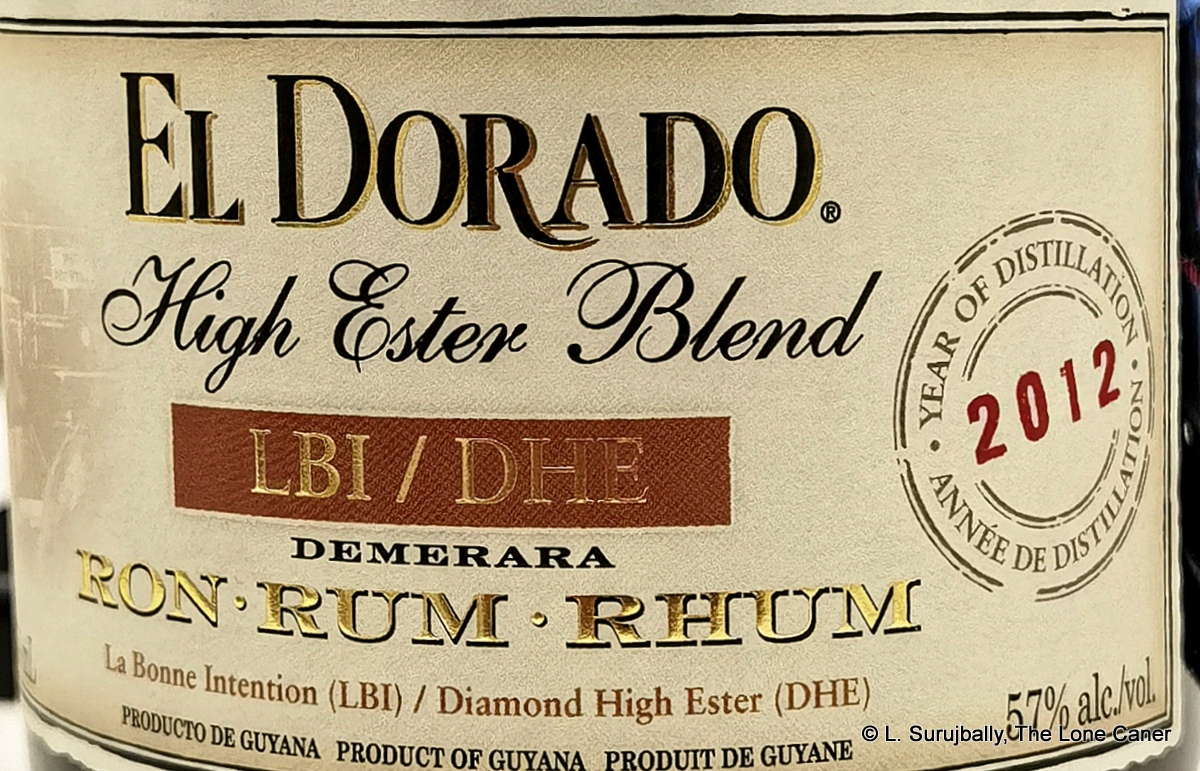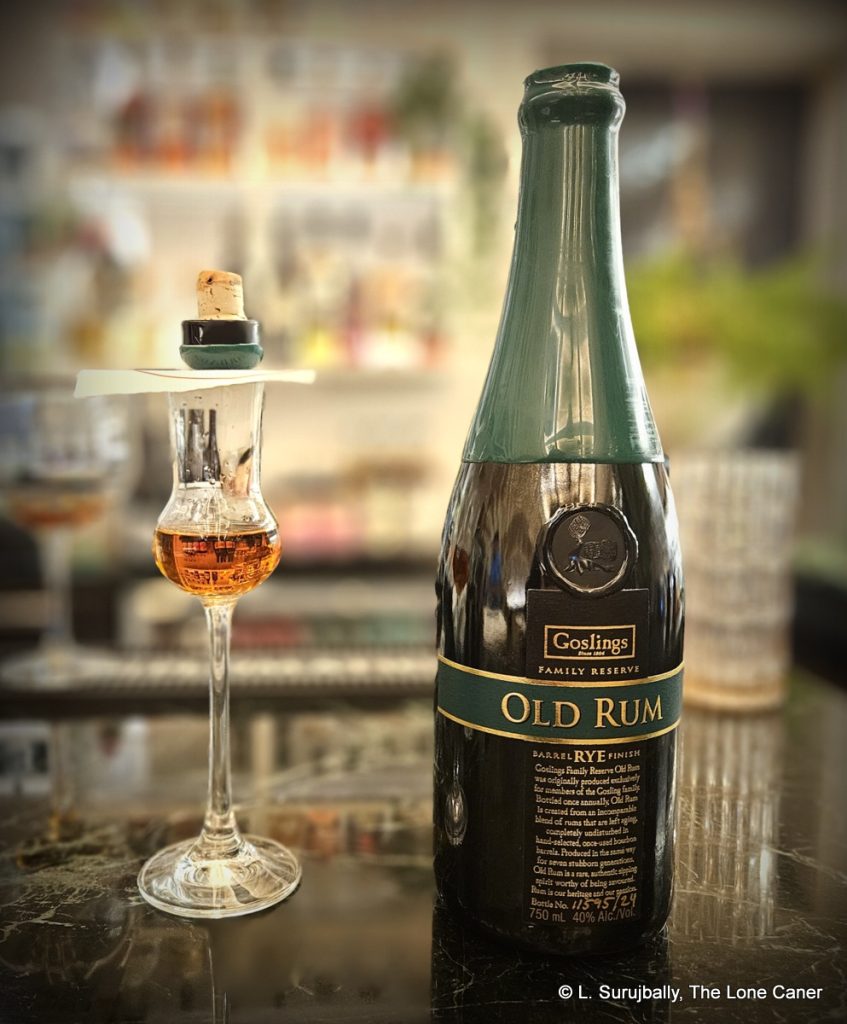 The Family Reserve Old Rum released by Gosling’s is, aside from the single barrel “Papa Seal” edition, probably their top end, limited edition, premium rum, and depending on where you are, costs around CAN$80-100. I’m not sure how regularly they come out, since this is not mentioned on the bottle labels or the website, but based on secondary sources, I think it’s an annual thing. The original release, which was first seen in the early 2000s and is not a seriously limited anything, is the most commonly seen.
The Family Reserve Old Rum released by Gosling’s is, aside from the single barrel “Papa Seal” edition, probably their top end, limited edition, premium rum, and depending on where you are, costs around CAN$80-100. I’m not sure how regularly they come out, since this is not mentioned on the bottle labels or the website, but based on secondary sources, I think it’s an annual thing. The original release, which was first seen in the early 2000s and is not a seriously limited anything, is the most commonly seen.
But in 2024, Gosling’s decided to put out something a bit different: the same Old FR Rum… aged for a further three years in Rye casks. That at least showed they were thinking a little outside the box and wanted to explore different variations of the standard line, though for my money I think they could have beefed it up a bit and not just stuck with the same old standard strength: after all, if you are releasing something more upscale, the people who have the coin to afford it are likely to have more experience with spirits that are of a higher proof anyway, so what’s the issue?
Be that as it may, beyond the secondary maturation, the rum conforms to all the markers of the original: 40% ABV, a molasses-based blend, ex-bourbon ageing for the first 16-19 years, probably a pot-column still mashup. I’ve already commented on this lack of disclosure regarding production details, so won’t rehash my remarks here yet again.
So, what’s it like? Well, all in all, not bad. The extra ageing makes itself felt on the nose with some light sweetness, nougat, almonds, unsweetened chocolate and coffee grounds, with a nice touch of dried prunes and raisins. There’s a vague mint and briny note here that’s probably the rye cask influence, plus vanilla and caramel and even an overripe apple or two to mix things up.
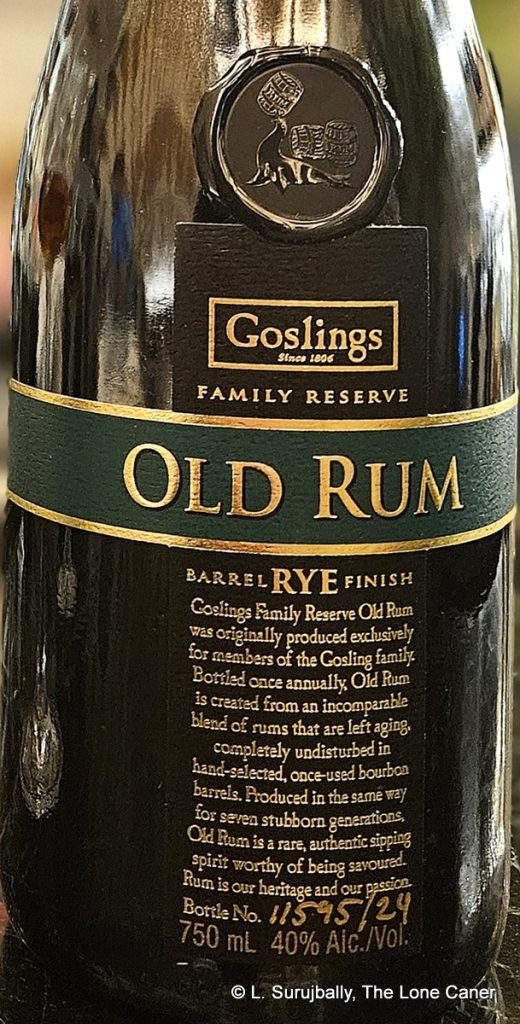 It’s as warm and and easy on the palate as the nose – there is no aggressiveness here. That’s both a good and a bad thing, depending on your preferences, but I will say it’s really pleasant. The tastes hearken to light citrus (tangerines, ruby grapefruit), with additional notes of bubble gum, black pepper, vanilla, cinnamon, toffee, honey, oak, wet coffee grounds. The finish is consistent with the Original FR edition, which is to say, nothing special, repeating all the notes we’ve already seen on the nose and the palate – dried fruits, honey, pepper, slight citrus, vanilla and some sweet..
It’s as warm and and easy on the palate as the nose – there is no aggressiveness here. That’s both a good and a bad thing, depending on your preferences, but I will say it’s really pleasant. The tastes hearken to light citrus (tangerines, ruby grapefruit), with additional notes of bubble gum, black pepper, vanilla, cinnamon, toffee, honey, oak, wet coffee grounds. The finish is consistent with the Original FR edition, which is to say, nothing special, repeating all the notes we’ve already seen on the nose and the palate – dried fruits, honey, pepper, slight citrus, vanilla and some sweet..
Some online reviews remark on the impact that the rye ageing imparts – I don’t get much of that myself, however, and the improvement of the profile it displays could just as easily come from better barrel management and additional ageing as the whisky influence. Overall, it’s a good rum for those who swim in the shallow waters of living room strength and a little extra complexity, without venturing out past the reef into the deeper trenches of shark territory.
I was not an enthusiastic fan of the “straight” Family Reserve – I might have been, earlier in my rum journey – here, this one succeeds in a way that the Original doesn’t. It displays, for want of a better word, just a shade more character. It tastes pretty good and noses well, it showcases some more zip and pep which is welcome, and if it fails on the counts of disclosure and on proof point, well, I can’t say I didn’t have a good time drinking it without guardrails or a life vest… or a shark cage.
Maybe that’s a recommendation after all.
(#1131)(83/100) ⭐⭐⭐½
Company background (from Review #1129)
Gosling’s hails from Bermuda, which is a British Overseas Territory, Britain’s oldest: the company is closely identified with the island and is, aside from tourism and some manufacturing, a mainstay of Bermuda’s non-financial-services economy.
The Gosling enterprise has been in business on Bermuda since 1806, when the ship’s charter for business in the USA expired while on the high seas. So instead of landing in Virginia, James Gosling, the son of a wine and spirits merchant in England, went ashore in St. George’s instead, and set up shop there with his brother, trading in spirits he had brought with him. Rum blending from imported distillates began in 1860, with the Old Rum brand launching three years later. The company’s rums were originally sold directly from barrels to customers who brought their own bottles, a practise that continued until the Great War; however, Goslings’ rums’ popularity and sales took off when they began salvaging used champagne bottles from the British navy’s officer’s mess, filling those with rum and sealing them with black wax.
The Old Rum was renamed the Black Seal, with the now-famous seal logo designed and coming into use in 1948: the champagne bottles are rarer now, used only for the Family Reserve line, but the logo has remained in use ever since. It is the company’s flagship brand and goes hand in glove with their signature cocktail “The Dark ‘n’ Stormy, which was developed in the mid 1960s and trademarked in 1980 (and rigorously enforced).
Other notes
- Video recap link
- The bottle number is 11595/24 – my conjecture is that the last two digits represent the year of release.
- Even though the rum is titled as having a Rye “finish”, my personal opinion is that any secondary ageing exceeding one year is no longer a finish but a secondary maturation.
